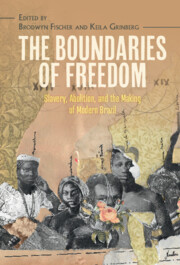Book contents
- The Boundaries of Freedom
- Afro-Latin America
- The Boundaries of Freedom
- Copyright page
- Contents
- Figures
- Tables
- Acknowledgments
- Introduction Slavery and Freedom in Nineteenth-Century Brazil
- Part I Law, Precarity, and Affective Economies during Brazil’s Slave Empire
- Part II Bounded Emancipations
- Part III Racial Silence and Black Intellectual Subjectivities
- 9 Breaking the Silence
- 10 The Life and Times of a Free Black Man in Brazil’s Era of Abolition
- 11 Political Dissonance in the Name of Freedom
- 12 “The East River Reminds Me of the Paraná”
- Part IV Afterlives of Slavery, Afterwards of Abolition
- Bibliography
- Index
12 - “The East River Reminds Me of the Paraná”
Racism, Subjectivity, and Transnational Political Action in the Life of André Rebouças
from Part III - Racial Silence and Black Intellectual Subjectivities
- The Boundaries of Freedom
- Afro-Latin America
- The Boundaries of Freedom
- Copyright page
- Contents
- Figures
- Tables
- Acknowledgments
- Introduction Slavery and Freedom in Nineteenth-Century Brazil
- Part I Law, Precarity, and Affective Economies during Brazil’s Slave Empire
- Part II Bounded Emancipations
- Part III Racial Silence and Black Intellectual Subjectivities
- 9 Breaking the Silence
- 10 The Life and Times of a Free Black Man in Brazil’s Era of Abolition
- 11 Political Dissonance in the Name of Freedom
- 12 “The East River Reminds Me of the Paraná”
- Part IV Afterlives of Slavery, Afterwards of Abolition
- Bibliography
- Index
Summary
This chapter seeks to illuminate the development of racialized subjectivities as an historical problem in nineteenth-century Brazil. It analyzes the letters and writings of the Afro-descendant engineer and abolitionist André Rebouças (1838–1898), with special attention to the role of racial silence in Rebouças’ personal diary and in the edited papers of his father, lawyer and statesman Antônio Pereira Rebouças (1798–1880). The self-narratives André Rebouças left to posterity are powerful testimony to the significance of transnational politics for universalist Black intellectuals in the nineteenth-century Atlantic world. In exploring them, this chapter illuminates the racialized subjectivization engendered by the stigma of slavery and portrays the ways in which its politicization was shaped by a collective transnational experience.
Information
- Type
- Chapter
- Information
- The Boundaries of FreedomSlavery, Abolition, and the Making of Modern Brazil, pp. 315 - 338Publisher: Cambridge University PressPrint publication year: 2022
